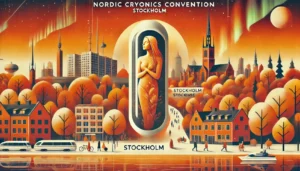FutureNews
The Latest News from the World of Cryonics and Beyond
New Breakthroughs In Cryonics-Related Sciences
Academic research is continually moving forward on cryopreservation fundamentals — some of which directly affect cryonics-related treatment, and indirectly inform cryonics strategy.
Here are four recent peer-reviewd papers (or preprints) within roughly the last month or so that are directly relevant to cryopreservation science:
Protein dynamics in supercooled cryoprotectant solutions
• Protein Diffusion and Stokes-Einstein Deviation in Supercooled Cryoprotectant Solutions explores how proteins behave at cryogenic temperatures, which informs how biological macromolecules might survive vitrification.
https://arxiv.org/abs/2512.02742
Thermo-mechanical modeling of freezing damage
• A new model analyses how freezing-induced stress causes damage in soft biological materials — a key barrier to cryopreservation success.
https://arxiv.org/abs/2511.15500
Computational optimization of cooling profiles
• Improving controlled slow-cooling strategies could reduce cellular injury during freezing, a topic directly relevant to organ and tissue preservation optimization.
https://arxiv.org/abs/2512.20805
Cryomacroscopy for vitrification studies
• A recently published cryobiology article presents a multi-view cryomacroscopy device designed to visualize vitrification, helping scientists study ice formation and vitrification quality in real time.
Frozen In France
From a recent article in Le Figaro by Ettienne Jacob:
“PARIS — “For €50 a month, you can be cryogenically frozen and then awakened in 300 years.” Last January, entrepreneur Anthony Bourbon, star of the show Qui veut être mon associé ? (“Who Wants to Be My Partner?,” France’s take on Shark Tank), stunned his interviewer Guillaume Pley, creator of Legend media, by admitting that he had signed a contract with German start-up Tomorrow Biostasis. Upon his death, the investor’s body will be recovered by a dedicated medical team, cooled down, and then stored in a huge tank in Switzerland at -196 °C.
“It’s certain that technology will allow us to wake up, through some kind of microwave. And then you’ll come back in a robot made by Elon Musk,” says the 37-year-old businessman…”
Some of the remarks in the article are more scientifically accurate than others, obviously, but a more vividly written and enjoyable cryonics article, in a more prestigious venue, would be hard to find.
Field Perfusion Now Available For Cryonics Institute Members
In a major advance or members of the Cryonics Institute–one of the two leading cryonics services providers in the United States with a total membership of 2,280–newly elected Director Lauren Fosco introduced Field Cryoprotection (FCP) as an upgrade option for CI members. The new option allows cryoprotectant perfusion to start in the field (before transport) rather than waiting until arrival at a facility.
More information is available in the Cryonics Institutes 2025 publication, Cryonics, available for free download here, and in the following video:
Flightless Bird Alights On Cryonics
In the August 19th, 2025, episode of Flightless Bird, podcaster David Farrier explores cryonics – “freezing human corpses in the hope they may one day be resurrected by future humans!” Featured is Farriet’s interview with James Arrowood, CEO of Alcor, one of America’s two leading cryonics services providers, to talk about the public’s perception of cryonics and what it means for Alcor’s hundreds of patients and thousands of members.
Listen to the Flightless Bird podcast featuring Alcor CEO James Arrowood here.
James Bedford on Youtube (Briefly)
There is a fine investigative article waiting to be written about Dr. James Bedford, the first man to be cryopreserved. Perhaps one day Dr. Bedford himself will write it. For now, however, the the world’s first cryonics patient remains in the care of Alcor and very little is available about about the life and thoughts of James Dedford, the Neil Armstrong of cryonics history.
Youtube appears to be ‘breaking the ice,’ so to speak, in the following, very short, smartphone video, which offers the barest smidgen of information about the man who took the first step, not on a lifeless moon, but into a future of life without inevitable death. Hopefully there will be more to come.
Forecasts of Technological Progress in Biostasis
In July 2025, arXiv published “Practitioner forecasts of technological progress in biostasis,”a forecasting paper surveying 22 domain experts in biostasis and cryonics, and asked which biomarkers, obstacles, and revival strategies they believed would be influential. (The consensus favored synaptic connectivity as the most useful biomarker for information preservation.)
The technical paper is available in full by clicking here.
Cryonics and the Technological Fictionalization of Death
Are technological advances the sole driver of cryonics acceptance, or can a cultural turn alone be sufficient, and if so, what are its characteristics and when might they arrive? Rafał Ilnicki of the Institute of Cultural Studies at Adam Mickiewicz University in Poznań explores these questions in a thoughtful academic paper published in Eidos: A Journal of Philosophy of Culture.
From the Introduction:
“The overcoming of human limits is inscribed in several contemporary processes that concern the usage of modern technologies. Those tendencies are focusing on ways of ending the era of human weaknesses. One of those weaknesses is death. Technology here is a fundamental factor of change and gives not only hope for people who want to transcend the limits of human beings, but also a basis for thinking and – this is most crucial – creating experimental technologies that would serve this goal. A temptation to treat those tendencies as science fiction should be abolished because of the significant changes they propose for culture. Nevertheless, transhumanistic, postulative technologies, even as inventions that are not yet fully working, are creating a metaphysical aura similar to science fiction. These technologies do not exist at the current developmental stages of technoscience. However, whether these technologies exist does not determine whether or not it is crucial to focus on their implications in the whole set of arrangements. They provoke philosophical, juridical, cultural, and medical problems that contemporary society must dissolve, or it will be held in a state of chaotic destabilization whenever new technology arises or some kind of innovations are developed. So even though cryonics today is not yet globally spread, we must take into consideration consequences of its development which have great impact on what it is to be human…”
The paper may be read in full by clicking here.
“A Leap From Fantasy To Reality In Germany”
In Germany, Tomorrow.bio is now offering people a service to preserve their bodies at extremely low temperatures after their death, along with a contractual commitmen to resurrect them once medicine has sufficiently advanced.
Tomorrow.bio’s CEO, Dr. Emil Kendziarro, elaborates, and FRANCE 24’s Nick Spicer, Anne Mailliet and Marie Pannetrat report.
Child Born After 30 Years Of Cryopreservation As An Embryo
From BBC News Online:
“A baby boy has been born to an Ohio couple from an embryo that was frozen for more than 30 years, reportedly setting a new world record.
“Lindsey, 35, and Tim Pierce, 34, welcomed their son, Thaddeus Daniel Pierce, on Saturday. Ms Pierce told MIT Technology Review her family thought “it’s like something from a sci-fi movie”.
“It is believed to be longest that an embryo has been frozen before resulting in a successful live birth. The previous record-holder was a pair of twins who were born in 2022 from embryos frozen in 1992.
“The Pierces had tried to have a child for seven years before they decided to adopt the embryo Linda Archerd, 62, made with her then-husband in 1994 through IVF.
“At the time, Ms Archerd initially created four embryos. One became her now-30-year-old daughter, and the other three were left in storage.
“Despite separating from her husband, she did not want to get rid of the embryos, donate them for research or give them to another family anonymously.
“She said it was important that she was involved with the baby, as they would be related to her adult daughter.
“Ms Archerd paid thousands of dollars a year for storage until she found a Christian embryo adoption agency, Nightlight Christian Adoptions, which runs a programme known as Snowflakes. Many of these agencies consider their programmes to be saving lives.”
Read more about the birth at BBC News and on MIT Technology Review, and about Embryo Cryopreservation at Wikipedia.
International Cryonics Museum Opens
A permanent museum dedicated to human cryopreservation has opened inside the Stanley Hotel’s former ice house in Estes Park, Colorado.
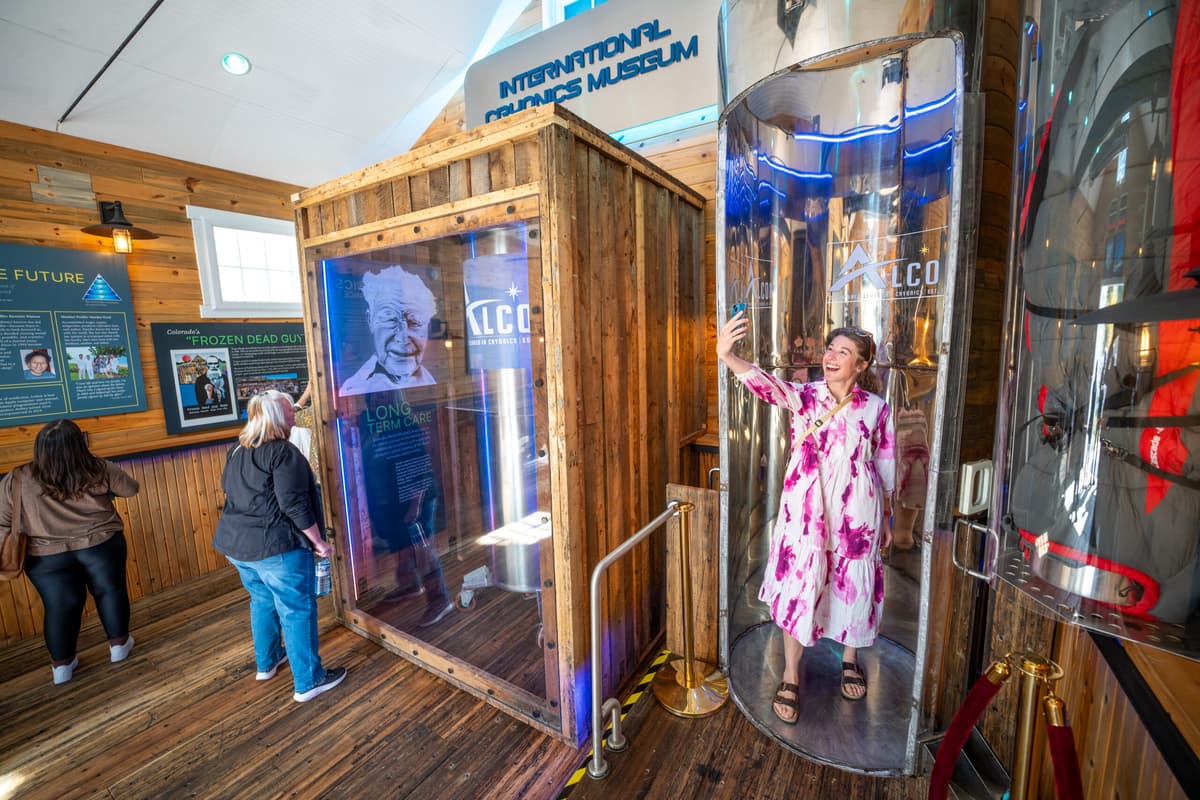 (John Berry/Courtesy of Visit Estes Park)
(John Berry/Courtesy of Visit Estes Park)
The museum is a collaborative effort between Alcor and the hotel, and gives visitors a close look at the history of cryonics, its ideas and leading figures, and a description of how cryopreservation is performed and how cryonics providers maintain and protect patients.
There are no actual preserved bodies on site, but the venue provides one of the most in-depth introductions to cryonics available to an increasingly interested public.
“There’s no question that people might find this weird,” said James Arrowood, the current president of Alcor. “It’s similar in its weirdness in that many emerging technologies are very, very weird at the outset. But the potential for human organ and tissue transplants are tremendous.”
Read more at CPR.org.
The museum offers 60 minute tours, and tickets are available online. Visitors can stop by from 10 a.m. to 10 p.m. every day of the week.
Another Cryopreservation in Australia
Southern Cryonics, located in Holbrook, near Melbourne, recently performed its second cryogenic freezing. A woman who passed away from a chronic illness was preserved at approximately −200°C.
More than 600 individuals worldwide have undergone the procedure. Southern Cryonics founder and former marketing specialist Peter Tsolakides is pleased to be one of the pioneers in providing cryonics services.
“Let’s say that it [cryonic revival] is possible but very unlikely — say it’s 10 per cent possible,” he said. “You have a 10 per cent possibility of living an extremely long life versus being buried underground or burned. Which one would you choose?”
Cryogenics and Quantum Computing: New Breakthroughs
Recent breakthroughs have enhanced cryogenic systems vital for quantum computing—particularly improving error correction and integration of classical electronics with quantum processors.
Quantum computers can solve problems that are too complex for classical computers thanks in part to a phenomenon called superposition. The most common building blocks in quantum computers — qubits — can have a value of 0 and 1 simultaneously, a superposition that enables quantum computers to perform parallel computations. Refrigeration is essential to this technology, for qubits must be cooled to cryogenic temperatures, just a fraction of a Kelvin above absolute zero, to perform without errors for long periods of time.
In his keynote during the last IIR Cryogenics 2025 conference held in Prague, Czech Republic on April 7-11, 2025, Pr. Ziad Melhem presented an overview of the recent advances in cryogenics for quantum computing. Cooling methods currently employed to achieve the low temperatures required for quantum computing. These include:
Dilution refrigeration (in which helium-3 atoms mix with helium-4, absorbing heat and cooling the system to even lower temperatures).
Cryocoolers. (Which cool a system by expanding and compressing gases like helium, hydrogen, or neon.)
Adiabatic demagnetisation. (Based on the principle that a system’s entropy decreases when its magnetic field changes at a constant temperature.)
Learn more at IIFIIR.org.
What’s New In Cryonics Fiction
A lot. Cryonics has been a long-time staple of science fiction, but these days the novels are coming thick and fast, in the YA market especially. Try reading these recent bestsellers:
1. Cryonic Dreams: Awakening (by John R. Carlos — July 2025)
“This near-future novel explores the societal and personal fallout of successful cryonic reanimation. Dr. Michelle Brown’s experimental revival of Maryanne after 133 years kicks off a thriller involving sabotage, murder, and a shadowy order determined to suppress the truth. When the chase leads to Mars, the stakes of memory, identity, and humanity itself ascend to cosmic levels.”
2. Deep Freeze (by Michael C. Grumley — 2024)
“A tense sci-fi thriller set aboard a derelict spaceship serving as a mausoleum for the frozen dead. Halley, the sole caretaker, must confront isolation, paranoia, and the possibility that not all her ‘residents’ are as lifeless as they seem. A claustrophobic, eerie setting that interrogates what happens when life—and memory—are suspended.”
3. Rise, Tomorrow Girl (by Cara Martin — June 2024)
“A gripping YA dystopian take on cryonics: In a pandemic-ravaged Canada, seventeen-year-old Leanne is frozen to save her life—and wakes years later haunted by ancestral memories and struggling to fit into a changed, fractured world. Themes of identity, survival, and the psychological fallout of being displaced in time make this a powerful, contemporary story.”
But it’s not only popular fiction that’s embracing cryonics themes. So is high literature. The cryonics novel of the moment is Frankissstein: A Love Story by British author Jeanette Winterson.
The novel merges speculative fiction and historical fiction, switching between Mary Shelley writing Frankenstein in Geneva, Switzerland in 1816 and the story of Ry Shelley, a transgender doctor, and Victor Stein, a transhumanist, who become involved in the world of artificial intelligence and cryonics in present-day Brexit-era Britain.
Writing for The Guardian, British novelist Sam Byers gave the novel a rave review, praising Winterson’s ability “to leaven the hyperinvention of rogue science with deeply evocative historical realism.”
Frankissstein was longlisted for the 2019 Booker Prize.
Season 4 Episodes 4 and 5: The Cryonauts
Sounds like one heck of a BBC science fiction series, but in fact it’s a podcast interview on Discord interesting enough to become a two-parter. Interviewer Kayla and cryonics advocate Jacob Cook discuss the youth persective on cryonics on cutting-edge social media:
Jacob Cook: Basically, it’s using extremely cold temperature to stop decay at the moment of clinical death and transport people into the future, hopefully.
Kayla: I love the way that you said, transport people into the future, because I think that’s, I don’t know, it’s such an optimistic way of looking at it and does feel very, you know, Sci-Fi adjacent. And I know that’s not necessarily every cryonicist’s ultimate goal or doing it, but it just feels very optimistic.
Jacob Cook: It is optimistic. I think of it as an ambulance into the future. That’s the common metaphor. There’s a word occasionally used, cryo transport. So instead of transporting someone through space to a hospital where they can be treated, we’re attempting to transport them through time to a future era in which technology which does not yet exist, could potentially enable their reanimation. But, of course, there are no guarantees of ever arriving there.
Kayla: I think the no guarantees thing is kind of a sticking point that maybe folks who are not into this or kind of anti cryonics will sometimes harp on. But some of the, like, the pro cryonic stance I’ve come across is more like, well, this is. It’s not a guarantee, but it’s more of a guarantee than being buried in the ground or being cremated or. It makes sense to me as having another alternative to end of life options. And this one has a little more, like I said, optimism to it. Do you have hope. It can be really nihilistic time in some ways. So what is your level of hope for the future?
Jacob Cook: Very high. Personally, it is a very nihilistic time. But no, I think that the future will be a better place, most likely, and I base that on 10,000 years of civilization. The overall trend line is overwhelmingly upward, and life is getting better on the longest scales. And if you see something in decline, well, that’s not happening on a multimillennial period. That’s happening in terms of years or decades.
https://www.cultorjustweird.com/s6e4-the-cryonauts-interview/
https://www.cultorjustweird.com/s6e5-the-cryonauts-conclusion/
Is Cryonics Bogus? Michio Kaku and Alcor’s Max More Lock Horns
Author, string theory co-founder, and science popularizer Michio Kaku did a short and remarkably uninformed and inaccurate cryonics video on BigThink recently.
It served to inspire a sharp rebuttal from Max More of Alcor, available on Youtube, and an even more insightful Youtube interaction between More and Kaku involving Neil DeGrasse Tyson. View all three here:
Michio Kaku: Why Cryonics Is Bogus:
https://bigthink.com/videos/why-cryogenics-is-bogus/
Max More: Why Kaku’s Critique Is Bogus:
More and Kaku on Cryonics: An Overview:
https://www.youtube.com/watch?v=JydMgZhhx_4
“When Will It Be Technologically Possible To Restore A Person Now In Cryonic Suspension?”
Human opinion differs. So the Cryonics Society thought it might be interesting to see what Artificial Intelligence has to say about it. We canvassed a few of the leading LLM’s for their opinions, and here are the responses:
ChatGPT:
“If current trends in neuroscience, nanomedicine, and AI continue without major disruption, it may become technologically possible to restore a person now in cryonic suspension sometime between 2100 and 2150. This would require the ability to fully repair or reconstruct brain tissue at the cellular or molecular level, restore memories and identity, and either regenerate or simulate a functioning body.”
Gemini:
“In my speculative opinion, based on the current pace of scientific advancement, particularly in nanotechnology, regenerative medicine, and artificial intelligence, it’s plausible that initial, limited successes in reanimating cryopreserved biological structures could emerge within 50-100 years. “
Grok3:
“Estimating the earliest date for technologically restoring a person in cryonic suspension is highly speculative, but some optimistic projections suggest it could be feasible by the late 21st century, potentially around 2070-2100.”
Deepseek:
“The most plausible estimate for revival is between 2060 and 2100, assuming continued scientific progress.”
Claude:
“My best estimate is that successful revival of currently cryopreserved humans will require 75-150 years, assuming continued exponential progress in nanotechnology, AI-assisted medicine, and cellular repair mechanisms. The critical breakthrough will likely be molecular-scale repair robots capable of fixing ice damage throughout the body, combined with advanced brain mapping and neural reconstruction techniques.”
Perplexity.ai:
“Some cryobiologists suggest that the first cryonic revival might be possible around the year 2040, primarily hinging on breakthroughs in nanotechnology that could repair cellular and tissue damage.”
Microsoft Copilot:
“If I had to make a bold speculation, I’d say sometime in the late 21st century to early 22nd century—possibly between 2080 and 2150.”
Consensus opinion? It looks to Artificial Intelligence as though cryonics will be here in roughly 35 to 75 years, and possibly as early as fifteen years from now.
Will you?
Shandong Yinfeng and the Future of Cryonics
In Shandong Yinfeng, the government of China and the Yinfeng Biological Group are pioneering a new cryonics beachhead in Asia. What may the prospect of state-supported research into cryonics and state-supported care for cryonics patients mean, and what does the launch of a serious cryonics effort by one of the most dynamic, technologically ambitious nations in world history portend?
Learn more below in a special Cryonics Society report.
Shandong Yinfeng and the Future of Cryonics
U.S. Court Redefines Death? Landmark Ruling Grants Cryonics Patient Novel Legal Status
In a decision that could reshape the legal and ethical boundaries of life and death, a California Superior Court has ruled that a cryopreserved individual can be classified as in “stasis” rather than legally “deceased”—a first-of-its-kind judgment that may pave the way for future legal personhood for the cryonically preserved.
The Case That Challenged the Definition of Death
The lawsuit was filed by Janet Carlisle, a 58-year-old terminally ill patient who signed up with the Alcor Life Extension Foundation in 2024. Before her death from pancreatic cancer, Carlisle’s legal team argued that her post-cryopreservation status should reflect her intent: not burial, but potential future revival.
In a 4-3 decision, the court sided with Carlisle’s estate, stating that because her contract with Alcor specified “biological preservation under stasis conditions,” the term “deceased” was “legally imprecise and prejudicial.” The ruling stops short of declaring cryonics patients “alive” but establishes a third category—neither fully dead nor alive in the traditional sense.
Legal experts say the decision could have far-reaching implications:
-
Estate & Tax Law: Cryonics patients in “stasis” may no longer trigger immediate estate distribution, allowing assets to remain in trust indefinitely.
-
Medical Consent: Future experimental revival procedures could be authorized under the same legal frameworks as experimental medical treatments for comatose patients.
-
Criminal & Civil Rights: Could a cryopreserved individual theoretically “inherit” property or even vote via AI proxy? The ruling opens the door to such debates.
“This is the first crack in the legal wall separating ‘dead’ and ‘alive,’” said Dr. Rebecca Sung, a bioethicist at Stanford. “It doesn’t mean frozen people are coming back tomorrow—but it means the law is starting to acknowledge that death may not be as binary as we thought.”
What’s Next?
Legal scholars predict appeals, but the case has already inspired similar lawsuits in Texas and Florida, where cryonics firms are concentrated. If upheld, the ruling could pressure other states—and eventually federal courts—to redefine death statutes for the first time since the Uniform Determination of Death Act (UDDA) was adopted in the 1980s.
For now, the Carlisle decision is a symbolic victory for cryonics advocates. As Alcor CEO Max More told reporters: “This isn’t about cheating death—it’s about giving science a chance to catch up.”.
Lauren Fosco Joins Cryonics Institute Board of Directors
Lauren Fosco (Chief Operating Officer at Biostasis Technologies) has been elected the Board of Directors of the Cryonics Institute as its newest and one of its youngest Directors.
Involved in cryonics since 2021, and mentored by the late CI director Jim Broughton, Lauren comes to CI from the aerospace engineering industry, and brings systems engineering, operations, and risk mitigation skills to the CI board.
As a younger cryonicist, Lauren brings a fresh up-to-date perspective to the Institute, and plans to tackle its complex challegenges by implementing novel, data-driven solutions.
The cryonics community is predominantly male, with women comprising about one-third of cryonicists, according to The New York Times. Fosco’s prominence as a female leader, alongside others like Allison Duettmann of the Foresight Institute, helps diversify the field’s leadership and aligns with efforts to make the cryonics movement more inclusive.
Switzerland Considers Legalizing Cryonics:
A Potential Game-Changer for Life Extension” in Europe
Switzerland, known for its progressive stance on biomedical ethics, is now weighing a historic move: legalizing cryonics, the controversial practice of preserving legally dead individuals at ultra-low temperatures in hopes of future revival. If approved, the country could become Europe’s first hub for cryonic preservation, attracting patients from across the continent where the practice remains largely banned or unregulated.
The Push for Legalization
The debate gained momentum earlier this year when a coalition of biotech firms, longevity advocates, and legal experts submitted a proposal to Switzerland’s Federal Ethics Committee on Non-Human Biotechnology (ECNH). The proposal argues that cryonics should be classified as an “experimental medical procedure” rather than a form of burial, which would place it under existing frameworks for biomedical research.
Supporters point to Switzerland’s history of pioneering assisted suicide and stem cell research as evidence that the country is uniquely positioned to lead on cryonics regulation. “This isn’t about guaranteeing immortality—it’s about offering citizens the right to choose post-mortem preservation without legal ambiguity,” said Dr. Felix Reinhardt, a Zurich-based bioethicist advising the initiative.
Current Legal Gray Zones
At present, Switzerland has no explicit ban on cryonics, but strict laws on burial and corpse handling create barriers. Unlike the U.S., where companies like Alcor and Cryonics Institute operate openly, Europeans seeking preservation must typically arrange costly transport to American facilities—a process fraught with logistical and legal risks.
A 2024 case involving a German cryonics patient whose body was held at customs for weeks highlighted the need for clearer regulations. Swiss lawmakers are now considering amendments to the Swiss Civil Code to recognize cryonics contracts as legally binding, provided they meet strict consent and transparency standards.
What’s Next?
A working group is expected to deliver recommendations by late 2025, with possible draft legislation in 2026. If passed, Switzerland could see:
- The first European cryonics storage facility, likely in a tax-friendly canton like Zug or Geneva.
- Standardized contracts for Swiss residents, ensuring legal protection for preserved individuals.
- Increased collaboration with U.S. cryonics firms and AI/neuroscience startups working on revival technologies.
For now, the proposal has ignited a rare cross-disciplinary debate—blending law, medicine, and philosophy. As Dr. Reinhardt notes, “This isn’t just about freezing bodies. It’s about redefining how society views death itself.”
Brain Scientists Achieve Near-Perfect Synaptic Preservation in Animal Brains
The Brain Preservation Foundation (BPF), a nonprofit research organization dedicated to advancing cryonics and brain banking, has announced a major milestone: validation of a new technique that achieves near-perfect preservation of brain structures at the synaptic level in animal models.
The findings, peer-reviewed and set for publication in Frontiers in Neuroscience, could have profound implications for cryonics, neuroscience, and the long-debated possibility of mind uploading.
The Breakthrough: How It Works
The BPF’s research team, led by Dr. Kenneth Hayworth (a neuroscientist and president of the BPF) and Dr. Shawn Mikula (a specialist in connectomics), tested an advanced form of aldehyde-stabilized cryopreservation (ASC) on rabbit and pig brains. Their method combines:
Chemical fixation – Using glutaraldehyde to rapidly halt decay and lock proteins in place.
Vitrification – Replacing water with a cryoprotectant solution to prevent ice crystal damage.
Long-term deep-freeze storage at -135°C (-211°F).
Electron microscopy scans revealed that over 95% of synaptic connections remained intact, a level of preservation previously thought impossible. “This isn’t just freezing—it’s a form of ultra-high-fidelity brain embalming,” said Hayworth.
Most current cryopreservation methods cause some cellular damage. If ASC can be scaled to humans, it could make future revival or whole-brain emulation far more plausible.
The technique could allow researchers to map complete neural circuits with unprecedented accuracy, aiding studies on memory and brain diseases.
Some futurists, like Aubrey de Grey, argue that brain preservation is the most viable near-term path to biological immortality, even if revival remains decades away.
Hurdles remain: some neuroscientists, like Dr. Christof Koch of the Allen Institute, caution that synaptic preservation doesn’t guarantee consciousness or identity could be restored. And the BPF’s method is currently only validated for research, not human cryonics, raising questions about regulatory approval.
Dr. Hayworth remains optimistic: “We’re not saying revival is around the corner—but for the first time, we can say with confidence that the brain’s wiring can be saved. That’s a game-changer.”
Cryonics Institute Magazine June 2025 Issue Released
Cryonics Institute Magazine, the official publication of the Cryonics Institute (along with Alcor, on of the two leading cryonics providers in the world today), has just issued its latest publication, featuring news updates, scientific articles and helpful resources for all those in cryonics, and for those newly interested in this life-saving technology.
The magazine includes listings and contact information for cryonics groups and support groups worldwide, membership maps, and health and science articles from today’s leading publication.
You can read the magazine in full online here:
https://cryonics.org/wp-content/uploads/2025/06/CI-MAG-2025-01.pdf
European Cryo Provider Tomorrow.Bio Gets €5 Million In Funding
Berlin-based Tomorrow.Bio, a company specializing in human cryopreservation, has secured €5 million in seed funding to boost new growth. The investment round was led jointly by early-stage venture investment group Blast.Club and Truventuro, the family office of entrepreneur Nils Regge.
According to Tomorrow.Bio co-founder and CEO Dr. Emil Kendziorra, the funding will help the firm expand its operational footprint, particularly into the U.S. market, while intensifying research aimed at refining preservation techniques. “We’ve aligned with forward-thinking investors who understand our long-term vision—not only to broaden our geographical reach, but also to push the boundaries of cryopreservation science,” said Kendziorra.
Tomorrow.Bio was established in 2020 by Kendziorra, a medical doctor and former oncology researcher, and tech entrepreneur Fernando Azevedo Pinheiro. Both founders previously launched and exited successful technology ventures before shifting focus to the cryonics, life extension, and longevity space. Frustrated with the pace of progress in cancer treatment, Kendziorra chose instead to explore radical life-extension strategies.
The startup’s clients are preserved in Switzerland at facilities operated by the European Biostasis Foundation (EBF), with which Tomorrow.Bio collaborates closely.
To date, 20 humans and 10 pets have been cryopreserved under the company’s protocols, with over 800 others registered. Total contract commitments now exceed €160 million. Patients are ultimately preserved in tall, vacuum-insulated steel containers at the EBF facility in Rafz, Switzerland.
The company plans to establish additional standby units in Europe and at least three U.S. states—New York, California, and Florida. If realized, this would make Tomorrow.Bio the first global cryonics firm to offer near-immediate response capabilities in multiple international locations.
Nils Regge praised the company’s ambitious mission: “This is the kind of bold, transformative project that could fundamentally change our understanding of mortality and longevity—and deliver enormous value in the process.”
Anthony Bourbon, CEO of Blast.Club, called Tomorrow.Bio a technological trailblazer. “The company is well-equipped to tackle the challenges of cryonics and scale its impact. The clarity and realism of Emil and Fernando’s vision could redefine what we consider possible in the field of life sciences.”
Cryonics Institute Annual Gathering: September 7, 2025
Mark your calendars for September 7 of this year, for the 2025 Annual General Meeting of the Cryonics Institute. The CI AGM will be held in Clinton Township, MI.
The Institute plans to start the weekend with a special Night Before Dinner on Saturday the 6th, and hold the meeting itself the following day on Sunday. Sunday will begin with an optional tour of the CI facilities. After the tours, guests wlll convene at a separate location for the meeting.
CI is currenty negotiating a venue for the meeting, so those interested should contact the Cryonics Institute through its website for further details.
Time Runs Out: Australian Mother Turns To Crowdfunding To Cryopreserve Her Child
“Time is running out for Clare McCann to cryogenically preserve her son who died by suicide last week,” announced a heatbreaking headline of a news story at News.Com.Au by Cydonee Mardon dated May 30, 2025.
“The devastated mother desperately trying to keep the lifeless body of her 13-year-old boy preserved so he can “come back to life” and see the world is not such a “cruel, horrible place” – and people really do love him.
“With just 48 hours left to raise $300,000 for cryopreservation, McCann is acutely aware she might miss the crucial time window, and the thought of what to do next is debilitating…. her only child Atreyu had died by suicide on Friday after several months of relentless bullying at high school.
*
“If my son’s in cryo, I’m going into cryo. Do you think I’m just gonna let him wake up by himself to his misery? No. And even if I don’t make it, I’ve got friends who’ve said they’ll commit and they’ll do it.
“I want him to wake up and see the world can be more kind, and he can get the proper help he needs in a mental health care facility. He can have a second chance.”
Founder of Southern Cryonics Peter Tsolakides told news.com.au time was fast running out for McCann but he was doing everything possible to help.
“We have already lost valuable time so the conditions are not optimal for success for Clare’s boy, but no one ever knows, we will help her in whatever way we can. All the members here feel so sorry for what she’s gone through,” Mr Tsolakides said.
*
As to all too often the case, last minute attempts to fund cryopreservation did not succeed, and donations sent to GoFundMe are now directed to providing a memorial.
If, as a result of this story, those thinking of providing a cryonics option for themselves and their loved ones take quicker action to ensure safe coverage in their own cases, perhaps the unfortunate passing of Atreyu will not have been in vain.
First International Cryonics Conference in Israel
On April 3, 2025, Israel hosted its inaugural international cryonics conference. The event featured presentations from leaders of cryonics institutions worldwide, marking a milestone in global collaboration for life extension and biostasis research.
Cryonics Institute Introduces Whole-Body Field Cryoprotection
The Cryonics Institute, in partnership with Suspended Animation, Inc., has announced the availability of whole-body Field Cryoprotection (FCP) for its members. This procedure involves replacing a patient’s blood with a cryoprotectant at their location, reducing cellular damage by eliminating the need for cold transport to the cryonics facility.
A promotional discount is available for CI members until May 21, 2025.
Learn more at the Suspended Animation Inc services page at the Cryonics Institute web site.
Tomorrow Bio Expands Cryopreservation Services Including Pet Cryopreservation for United States residents
Berlin-based Tomorrow Bio has expanded its cryopreservation services to the United States, and now offers services in New York, California, and Florida.
This April, the company also launched pet cryopreservation services in the U.S., offering pet owners a new way to preserve their animals after death.
Read about the new developments at the Tomorrow Bio blog online.
Cryogenics Society of Europe Celebrates 10-Year Anniversary
April marked the 10th anniversary of the Cryogenics Society of Europe (CSE), established in 2015 to foster collaboration among European cryogenics professionals.
The society will commemorate this milestone with the European Cryogenic Days & Cryogenic Heat and Mass Transfer Workshop, scheduled for October 27–30, 2025, at the University of Twente.
‘Uniting 23 Countries For Cryogenics Progress’: the 18th IIR Conference
The 18th International Institute of Refrigeration (IIR) Conference on Cryogenics took place from April 7–11 in Prague, Czech Republic, bringing together 138 participants from 23 countries. Key topics included:
-
Cryopreservation of cells, tissues, and organs, with a focus on vitrification techniques.
-
Cryogenics in particle physics, superconductivity, and quantum technologies.
-
Hydrogen liquefaction and storage for clean energy systems.
CI President Plans Cryopreservation for Entire Family
Dennis Kowalski, president of the Cryonics Institute, has invested over £110,000 to arrange for the cryopreservation of himself and his family upon their deaths. He views this as a “lottery ticket to immortality,” aiming to give his family a chance at life extension through future scientific advancements.
The Cryonics Institute currently houses over 264 preserved bodies, including humans and animals, in liquid nitrogen vats.
Read about it in The Sun‘s UK Edition.
Alcor CEO James Arrowwood Presents To Arizona Legislature
James Arrowwood of Alcor recently presented to the Arizona House Science & Technology Committee, generating enough interest from committee members to schedule a follow-up visit to Alcor facilities for a tour and to talki directly with Alcor science and engineering teams.
The Law of Cryonics: A Legal Philosophical and Financial Analysis
This 2025 article in the journal Medical Law Review examines The Law of Cryonics: A Legal Philosophical and Financial Analysis (Abingdon: Routledge, 2024) in which Pierre de Gioia Carabellese and Camilla Della Giustina delve into the legal and financial complexities surrounding cryonics. They analyze the challenges of defining legal death, the implications for estate planning, and the necessity for regulatory frameworks to govern cryonics practices, underscoring the need for clear legal guidelines to address the unique issues posed by cryonic preservation.
https://academic.oup.com/medlaw/article-abstract/33/1/fwaf008/8020898
Brain Preservation and Cryonics Through the Lens of Moral Psychology
Published in Neuroethics in January 2025, this paper by Alexander German and Max Tretter examines the psychological and moral factors influencing public attitudes toward cryonics. The authors propose that intuitive moral aversions, such as feelings of disgust or concerns about purity, may hinder acceptance of cryonics. They suggest reframing cryonics using metaphors like “Schrödinger’s chrono-cat” to mitigate these aversions and foster more constructive public discourse.
Seth McFarlane On Cryonics
Author, Actor and Drector Seth McFarlance talks with Larry King about why he chose to sign up for cryonics,
Ben Best Update
At 6:15 PM, March 12, 2025, as he was pulling into the driveway of his house after dropping my car off at a KIA shop for routine maintenance, longtime cryonics activist and former Cryonics Institute President Ben Best noticed that the dash monitor indicated there was a problem. As he got out of his car, smoke billowed out from under the hood, and the car burst into flames.
A neighbor called the fire department, and neither Ben nor anyone else was injured. The vehicle, however, was completely destroyed. Nonetheless it was a close call, and a timely warning for all those interested in life extension. Life is precarious, and ensuring that one”s cryonics coverage is up to date is well worth doing. All those involved in cryonics, and many beyond, unite in gratitude at Ben’s good health and wish him well.
US Billionaires Bet On Cryonics
“As of now, 5,500 individuals have planned for cryogenic preservation, and 500 bodies are currently in storage”
“In the quest for eternal life, US billionaires are turning to cryonics, the science of freezing bodies with the hope of future revival.
“This radical approach aims to preserve their bodies and wealth, ensuring that when they return to life, their fortunes remain intact, reported Bloomberg. The trend has spurred lawyers to create ‘revival trusts’, a novel legal framework designed to manage and protect the wealth of the cryogenically preserved.”
Read more (or listen to an audio version of the Business Standard article) at:
The Imagery of Cryonics
One of the most important things about cryonics support and acceptance is how people think about it. But what does AI think about it? As we now, AI rests on the concept of Large Language Models (LLMs), and LLMs search through vast databases (including the internet) and feed back the largest, most general and common responses. With that in mind, the Cryonics Society thought it would be an interesting experiment to have ChatGPT create several images of cryonics and how it thinks the public percieves it. Pretty well, apparently. Below are some of ChatGPT’s visual replies.
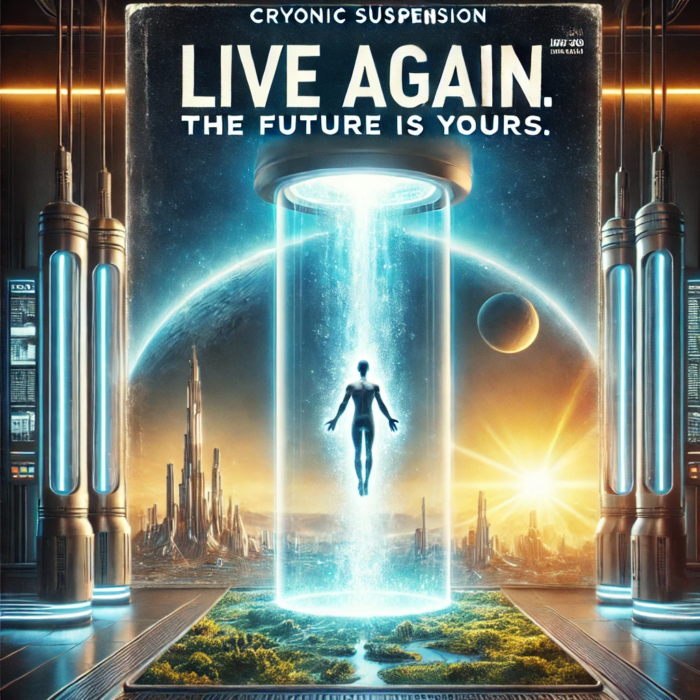
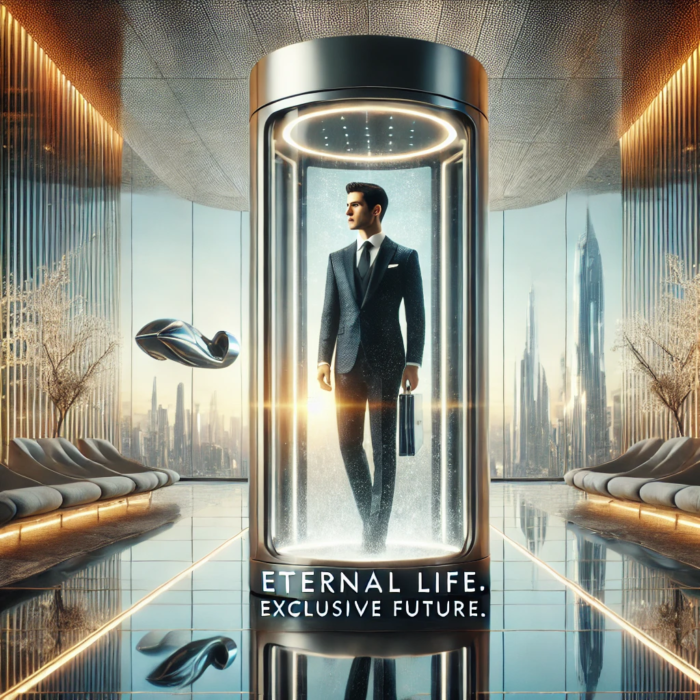
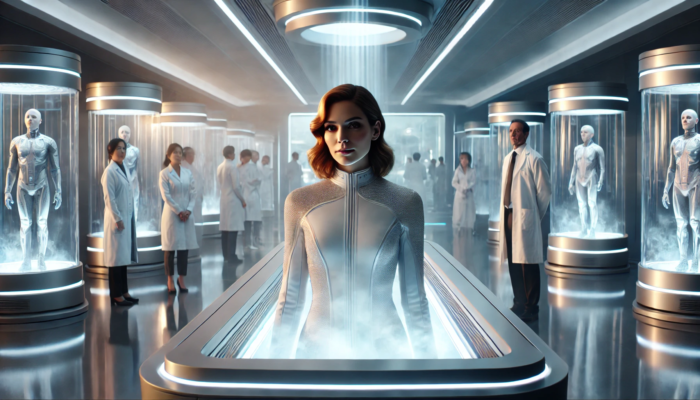
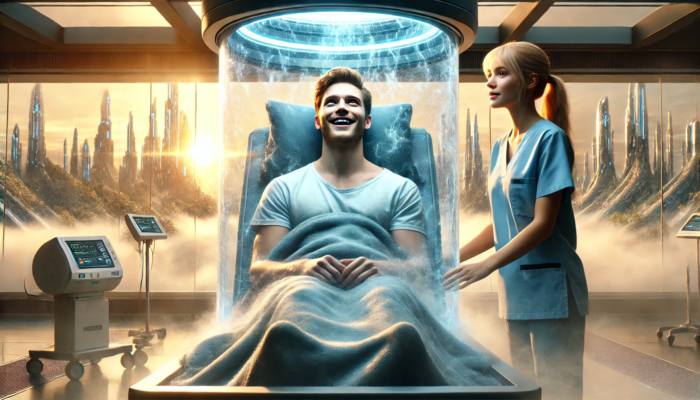

Of course, some products of artificial intelligence are still more artificial than intelligent…
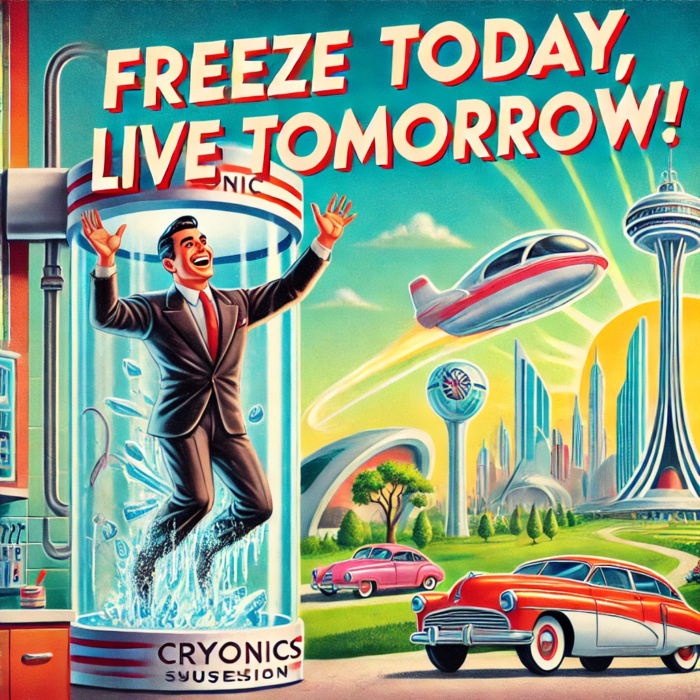
BBC 2025: Overcoming Death for the Price of a Sports Car?
“A German cryonics start-up is offering a chance at a second life for the cost of a sports car. Is cryogenics within reach, or still an empty promise?
“The ambulance parked up by a green in central Berlin is small, almost toy-like; a thick orange stripe across its sides, a tangle of wires looping from the ceiling.
“It is one of three retrofitted and operated by Tomorrow.Bio, Europe’s first cryonics lab, whose mission is to freeze patients after death, and one day bring them back to life, all for a cost of $200,000 (£165,000).”
Read the January 15, 2025 article online at:
Cryogenics and Revival Trusts – Really?
George F. Bearup, J.D., Senior Legal Trust Advisor at Greenleaf Trust, an expert in estate, fiduciary, and tax law, with over 42 years of practical experience as an estate planning attorney, discusses the uses, complexities and promise of Revival Trusts in providing long-term asset protection for cryonics patients in a timely recent article:
31st Space Cryogenics Workshop Scheduled For May 2025
- Dates: May 13–15, 2025
- Location: Incline Village, Nevada, USA
- Venue: Hyatt Regency Lake Tahoe Resort, Spa and Casino
- Description: This workshop covers all aspects of space cryogenics, with a focus on applications related to space exploration. It features oral and poster presentations from industry, academia, and government participants.
18th IIR International Conference on Cryogenics Set For April 2025
- Dates: April 7–11, 2025
- Location: Prague, Czech Republic
- Venue: Tristar Olympik Hotel
- Description: This biennial conference addresses challenges in equipment and technologies operating below 120 K (-153°C), encompassing topics such as cryophysics, cryoengineering, liquefaction and separation of gases, and cryobiology and cryomedicine.
Cryogenic Engineering Conference (CEC) and International Cryogenic Materials Conference (ICMC) Set For May 2025
-
2025 Cryogenic Engineering Conference (CEC) and International Cryogenic Materials Conference (ICMC)
- Dates: May 18–22, 2025
- Location: Reno, Nevada, USA
- Venue: Peppermill Reno Resort
- Description: The 26th joint CEC/ICMC conference will cover a diverse range of cryogenic-related topics, from basic material properties to large-scale applications, including hydrogen technologies, cryocoolers, superconductivity, and medical applications.
“A Father’s Wish To Be Preserved”:
The New Yorker Presents A Cryonics Documentary
In filmmaker Ömer Sami’s October 2024 documentary short, a man’s wish to be cryogenically frozen is given a tour of a cryonics facility and discussions his decision with his wife and children.
“Nasar Ghafoor started a family late in life, and fears that he won’t be there to see his four young children grow up. The average life expectancy for men—around seventy-eight years—looms large on his mental horizon. He decides he is interested in being frozen after death, in the hope of being reanimated.
“Sami captures the family’s warmth and closeness, and the scope of the question that weighs on them: What lengths would you go to for more time with those you love?”
See the entire documentary video here:
https://www.newyorker.com/culture/the-new-yorker-documentary/a-family-reckons-with-a-fathers-wish-to-be-preserved-using-cryonics-in-eternal-father
Elon Musk On Cryonics
High School Hack Club gets the world’s richest man to share his views on cryo.
‘Patient One’:
Australian Cryonics Firm Freezes First Patient in Southern Hemisphere
Southern Cryonics, a newly founded cryonics firm which began operations in May 2024, and operates the Southern Hemisphere’s first known cryonics facility, announced that it has cryogenically frozen its first client at its Holbrook facility. The client, a man in his 80s, died in Sydney before being frozen at minus 200 degrees Celsius. He has become what the company refers to as ‘Patient One’.
“His family rang up out of the blue and we had about a week to prepare and get organised,” the Southern Cryonics representative stated. He explained that his team tested all the cryonics equipment, though this was their first actual a cryopreservation. “It’s still a little bit different when you are doing a real case,” he said.
According to ABC News Australia, ‘Patient One’ died on May 12 at a hospital in Sydney. The 10-hour process of preserving his body in the hope of bringing it back to life then began immediately.
The cryopreservation was announced on Southern Cryonics’ account on X/Twitter.
All The Cryonics News That’s Fit To Print
Miss curling up by the fireplace with a cup of hot tea and the latest news magazine? Just take out your laptop: the top two cryonics companies in the world, Alcor and the Cryonics Institute, have put out their latest publications for the year 2024 and are busy putting together new issues for a new year. You may not find them on the magazine rack at Barnes & Noble, but we’ve got them here.
Catch up on what’s happening with the industry leaders. Clicking on the links below, and read the PDFs directly, or print them out on the printer at home.
Alabama Rules That Cryopreserved Embryos Are Children
The decision was issued in a pair of wrongful death cases brought by three couples who had frozen embryos destroyed in an accident at a fertility clinic. Justices, citing anti-abortion language in the Alabama Constitution, ruled that an 1872 state law allowing parents to sue over the death of a minor child “applies to all unborn children, regardless of their location.”
What are the possible implications not just for the over one million embryos currently cryoreserved, but for the protection of cryonics patients?
Read about the decision here:
AI Videos of a Retro Future
One of the objections to cryonics is that patients will wake up in an unrecognizable future so different that that won’t be able to adjust. But is that really likely? Or will the future not only preserve a good deal of the past, but restore some of its most enjoyable features, and celebrate them?
Artists and AI are showing the way. An entire series of AI-generated jazz videos are appearing on YouTube showing us panoramas of a Retro Future that viewers in love with the Fifties would die die for–or maybe be willing to buy a cryonics ticket and live for.
Below are several of the most charming and striking of these videos. Have a click. The future will never quite look the same.
z
Nordic Cryonics Convention 2024
Cryonics Institute Expands Storage Capacity
The Cryonics Institute has completed its new storage facility in Michigan, expanding its ability to preserve more patients. With an influx of new members, the expansion marks a significant step in the Institute’s goal of providing long-term cryogenic preservation services at more affordable prices.
Cryonics Institute Facility Manager Andy Zawacki Interviewed by NBC News
First European Cryonics Patients Successfully Vitrified in Germany
Tomorrow Biostasis, a Europe-based cryonics organization, recently completed the first successful vitrifications of European patients. This marks a historic moment as cryonics gains ground outside the U.S., driven by increasing demand from European transhumanists and futurists seeking preservation options closer to home.
MIT Ends Contract With Neuropreservation Startup
The recent biotech Nectome is striving to a brain freeze technology intended to preserve the neurons and synapses in a human brain, and thereby (it claims) to secure the memories stored there, providing a digital backup for the brain.
The firm has attracted venture capital, including funds from investor and Y Combinator president Sam Altman. However, MIT Media Lab terminated a subcontract with Nectome following a negative report by MIT Technology Review describing the company’s promotion of its technology. The company continues to seek new investors.
Revivals by 2045: Ray Kurzweil’s Bold Cryonics Predictions
Futurist Ray Kurzweil, known for his predictions on AI and longevity, recently spoke at a life extension conference, claiming that cryonics patients may be revivable as soon as 2045. Kurzweil cited exponential advancements in nanotechnology and molecular biology as driving forces that could make this future a reality.
Cryonics and the Metaverse: The Next Frontier?
Natasha Vita-More, a leading advocate for cryonics and transhumanism, has suggested integrating cryonics with digital preservation. At a recent symposium, she proposed a hybrid model where people not only preserve their bodies but also upload digital versions of their personalities into the metaverse for continuous “life” before physical revival.
“90 Is The New 60”
Will we live long enough to see cryopreservation perfected? The New York Times examines the New Longevity.
Vitrified Kidneys Cryopreserved through ‘Nanowarming’
Freezing is only one part of the cryonics equation. The other is rewarming. Vitrified organs can ail due to ice crystallization if rewarming is too slow or from cracking due to thermal stress if rewarming is not uniform.
A team of researchers recently made a major breakthrough via “nanowarming,” an approach which employs alternating magnetic fields to heat nanoparticles within the organ vasculature, to achieve both rapid and uniform warming, after which the nanoparticles are removed by perfusion. The researchers cryogenically stored rat kidneys for 100 days and successfully recovered them.
Read The Report at the National Institutes of Health’s National Library of Medicine
British Scientist Calls For Restrictions On Marketing Cryonics
Clive Coen, a professor at King’s College London has condemned a high court decision in which a dying 14-year-old girl won a court battle to have her body cryogenically frozen. Said Coen, the case could have the “unintended consequence … that a lot of people are going to think this is worth a punt.”
Not all academics agree. Anders Sandberg, research fellow at the Future of Humanity Institute at Oxford University, disagreed. “There is a good chance they won’t make it, their chances are slim – but it beats the alternative.”
Read about the case here.
Celebrity Endorsements Boost Cryonics
Several prominent celebrities and tech moguls, including PayPal co-founder Peter Thiel and actors from the Marvel franchise, have publicly stated their interest in cryonics. Other Cryo Celebs include Paris Hillton, Ted Williams, Larry Flynt, and Britney Spears. Will trending celebrity endorsements push the cryonics option into the limelight?
Japan Cryonics Organizations Flourish
Not long ago the Japan Cryonics Association officially opened its doors, making it the first cryonics organization in Asia. Now several new organizations have popped up. With Japan’s rapidly aging population and its deep technological expertise, this trending move could well make Asia a key player in the cryonics movement.
Note: all text and commentary in the Cryonics Society web site may not be reproduced without the written prior consent of the authors.
Email: contact @ cryonicssociety.org
Tel.: 585-473-3321

